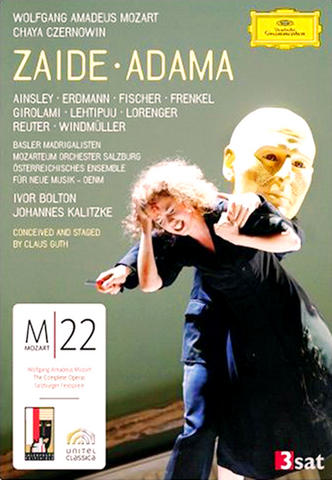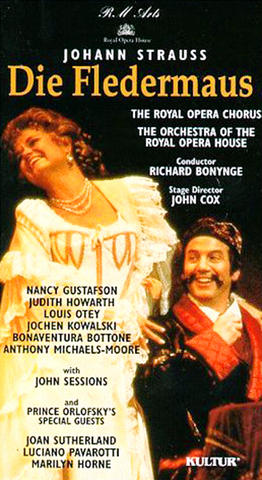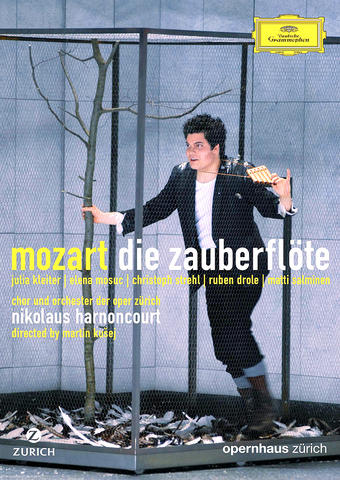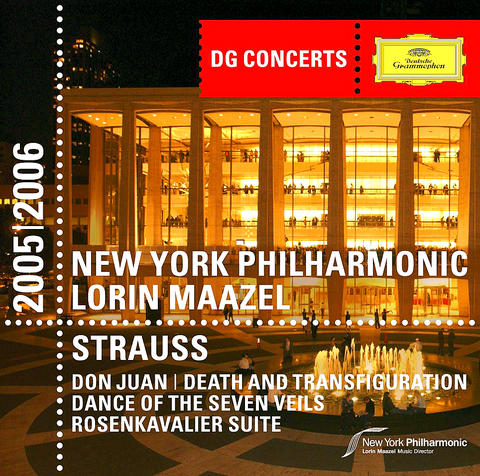Two Mozart operas lead in the classical music field this month. First is a new production of Die Zauberflote (The Magic Flute) from Zurich Opera, conducted by Nikolaus Harnoncourt. Second is the unfinished Zaide, given a new angle by Israeli composer Chaya Czernowin. The first is an undoubted success, while the second is likely to appeal to the brave-hearted.
Zauberflote is a director-driven production (or Eurotrash version to the opponents of such things). Consequently the serpent of the opening scene becomes twenty or so lifelike snakes, which the singers handle with scarcely concealed fascination. Papageno, instead of being a bird-catcher, is first seen imprisoned in an aviary. The set is a series of doors and sparsely-furnished, functional offices built on a revolving stage.
The production succeeds, however, because the music's spirit of mystery and magic is retained. The sense of characters who don't understand what's happening to them and a world ruled by mysterious forces - Masonic brotherhoods operating in modern offices - prevails.

The whole project is further guaranteed success by the stupendous playing of the Zurich forces under Nikolaus Harnoncourt. Never has this music sounded as lucid, with its beauty shining out like the colors of an old painting recently stripped of varnish. The soloists, mostly young, sing with exceptional grace and heart-felt simplicity, making this one of the most ravishing versions of this much-recorded opera currently available.
Matti Salminen makes a celebrity appearance as Sarastro, toning down his Wagnerian bass voice to fit the gentler style of late Mozart (as he explains in generous backstage bonus footage). Elena Mosuc makes a vituperative Queen of the Night, giving malicious meaning to Mozart's coloratura passages and at one moment disappearing, appropriately enough for an ice-queen, into a refrigerator.
The youngster soloists are all excellent. Ruben Drole (Papageno) proves the crowd-pleaser, as effective as an understated actor in his spoken text as he is a singer. All the dialogue, often cut down, appears to be included in this version.

This unexpectedly moving production represents a profound reading of Mozart's Zoroastrian masterpiece, suggesting that the human spirit can overcome even global capitalism. If you want to treat yourself to a real Christmas present, try this pair of intensely enjoyable DVDs.
Mozart never completed Zaide, leaving 75 minutes of music with no beginning and no end. What Chaya Czernowin has done is write a parallel mini-opera, called Adama, whose numbers are played alternately with Mozart's fragments. The styles are totally distinct, Czernowin's music being minimalist and atonal. Two separate orchestras, one situated behind the action, the other in front, tackle the different scores. But the stories are very much related. Mozart's tells of a harem slave girl, Zaide, who falls in love with a Christian boy, while Czernowin's offers the tragic love of a contemporary Israeli girl and a Palestinian man.
The action becomes violent in the second half, with torture and stonings to death. This is when Czernowin comes into her own - you can't imagine such events accompanied by Mozart's music. There was plenty of brutality in 18th-century Europe, but Mozart would not have thought it was music's function to represent it. As Czernowin explains in a brief bonus section, her essential theme is the difficulty of remaining an individual under the often-violent pressure of the group.

As part of the M22 project to issue all of Mozart's operas and opera fragments in new DVD versions, Zaide: Adama looks like an interesting failure. On the other hand, Mojca Erdmann's sublime and innocent singing as Zaide may be considered worth the price of the whole two-DVD set. If you like your art politicized and Mozart used to sugar the pill of modernism, then it might just be your somewhat bitter cup of tea.
With Johann Strauss' boisterous, if silly, Die Fledermaus due in Taipei from the NSO at the end of the year, it's worth remembering the DVD of the 1990 Covent Garden production. It doubled as a farewell to Joan Sutherland who appears in the ball scene, along with Pavarotti and Marilyn Horne. They proceed to sing music of their own choice, and the minute Pavarotti launches magnificently into an aria from Cilea's L'Arlesiana, the Strauss is revealed as the froth it is. The DVD is really only worth seeing for this mini-concert and the virtual onstage party at the end. It's sung in English with Chinese and English subtitles.
Lastly, Lorin Maazel and the New York Philharmonic are releasing a series of audio CDs featuring recent concerts, including one all-Strauss item (containing Don Juan, Death and Transfiguration, The Dance of the Seven Veils from Salome, and the first Rosenkavalier Suite). All are from concerts given in 2005. The sound quality is spectacular, and though I have heard more heartfelt renditions of these popular works, there must be few that are as acoustically transparent.

An important feature of this series, DG Concerts, is that most items are offered as Internet downloads, with some also issued (as this Strauss program is) on disc. The New York Philharmonic will be visiting Taiwan in February, with concerts scheduled in Taipei and Kaohsiung


When the South Vietnamese capital of Saigon fell to the North Vietnamese forces 50 years ago this week, it prompted a mass exodus of some 2 million people — hundreds of thousands fleeing perilously on small boats across open water to escape the communist regime. Many ultimately settled in Southern California’s Orange County in an area now known as “Little Saigon,” not far from Marine Corps Base Camp Pendleton, where the first refugees were airlifted upon reaching the US. The diaspora now also has significant populations in Virginia, Texas and Washington state, as well as in countries including France and Australia.

On April 17, Chinese Nationalist Party (KMT) Chairman Eric Chu (朱立倫) launched a bold campaign to revive and revitalize the KMT base by calling for an impromptu rally at the Taipei prosecutor’s offices to protest recent arrests of KMT recall campaigners over allegations of forgery and fraud involving signatures of dead voters. The protest had no time to apply for permits and was illegal, but that played into the sense of opposition grievance at alleged weaponization of the judiciary by the Democratic Progressive Party (DPP) to “annihilate” the opposition parties. Blamed for faltering recall campaigns and faced with a KMT chair

Article 2 of the Additional Articles of the Constitution of the Republic of China (中華民國憲法增修條文) stipulates that upon a vote of no confidence in the premier, the president can dissolve the legislature within 10 days. If the legislature is dissolved, a new legislative election must be held within 60 days, and the legislators’ terms will then be reckoned from that election. Two weeks ago Taipei Mayor Chiang Wan-an (蔣萬安) of the Chinese Nationalist Party (KMT) proposed that the legislature hold a vote of no confidence in the premier and dare the president to dissolve the legislature. The legislature is currently controlled

As we live longer, our risk of cognitive impairment is increasing. How can we delay the onset of symptoms? Do we have to give up every indulgence or can small changes make a difference? We asked neurologists for tips on how to keep our brains healthy for life. TAKE CARE OF YOUR HEALTH “All of the sensible things that apply to bodily health apply to brain health,” says Suzanne O’Sullivan, a consultant in neurology at the National Hospital for Neurology and Neurosurgery in London, and the author of The Age of Diagnosis. “When you’re 20, you can get away with absolute